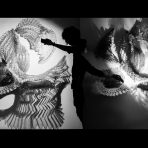Diluvio Presentation and Reception: Drawing Inspiration from Leonardo’s Deluge Drawings
Diluvio Presentation and Reception: Drawing Inspiration from Leonardo’s Deluge Drawings
Categories: Lectures and Seminars, Receptions, Lunches and Dinners, Visual Arts | Intended for Alumni, Anyone, Carleton Community, Current Students, Media, Prospective Students, Staff/Faculty

Main Floor Lobby MacOdrum Library
1125 Colonel By Dr, Ottawa, ON
Contact Information
Prof. Manuel Baez, 613-520-2600 ext. 2879, manuel.baez@carleton.ca
Registration
Cost
Free
About this Event
Host Organization: CINQUECENTO and the Azrieli School of Architecture
More Information: Please click here for additional details.
Diluvio Presentation and Reception by Professor Manuel Báez and His Students
All are welcome to join us for a public presentation of Diluvio, a sculptural installation inspired by Leonardo da Vinci’s deluge drawings, and a reception in the MacOdrum Library beginning at 6 p.m. on Friday, March 22, 2019.
Event Program
Introduction: Curious to know what we have in store for you this year? Want to learn more about how you can get involved in CINQUECENTO? At this event, CINQUECENTO Chair Angelo Mingarelli will provide an overview of how Carleton University plans to honour and celebrate Leonardo da Vinci in 2019. Prof. Mingarelli will be available during the reception for any questions related to how you can get involved in CINQUECENTO, either as a sponsor or as an event participant or contributor.
Presentation: Prof. Manuel Báez of Carleton’s Azrieli School of Architecture and Urbanism and students from his Crossings Interdisciplinary Workshop will present the underlying ideas behind the installation and how it has drawn inspiration from Leonardo’s deluge drawings and his studies of the dynamics of the flow of water, air, light, shadows and energy. There will be an opportunity to ask questions after the presentation.
Reception: Following the presentation, we invite you to browse the impressive works of Prof. Báez and his students as you enjoy complimentary light refreshments.
We hope to CU there!
About the Project
“Diluvio” is part of Carleton University’s Cinquecento: Carleton Celebrates Leonardo da Vinci, a year-long celebration honouring the renaissance genius on the 500th anniversary of his death in France on May 2, 1519. The installation is inspired by Leonardo’s reflections on the inter-connections within all of Nature as revealed by his studies of the flow of water, air, light, shadows, energy, and his evocative “deluge drawings.”
The installation is the recent work by students in the Crossings Interdisciplinary Workshop, offered by Prof. Báez in the Fall term of 2018 at the Azrieli School of Architecture and Urbanism. By working with aluminum mesh that’s been folded into a very fluidly malleable pattern, students were encouraged to experientially explore and improvise through these dynamic shape-shifting properties and their projected shadows while drawing inspiration from Leonardo’s speculations and studies.
Crossings Interdisciplinary Workshop Diluvio student teams:
Hamid Aghashahi & Guillermo Bourget Morales
Abigail Maguire & Edyta Suska
Connor Tamborro & Jasmine Sykes
Nikolina Braovac & Asmi Sharma
Petros Kapetanakis & Hadi Siddiqui
Daniel Baldassarri & Liam Yeaman
Shaylyn Kelly & Walter Fu
Kaleigh Jeffrey & Stephen Scanlan
Sepideh Rajabzadeh & Runjia Li
Dylan Rutledge & Tianlang Feng
Special thanks to Sami Karimi for his contribution to the Diluvio installation
“Leonardo saw nature as weaving an infinite variety of elusive patterns on the basic warp and woof of mathematical perfection. Nowhere could nature’s endless variations on geometrical themes be seen more marvellously than in the dynamics of water, above all in the configurations of vortices.”
– Martin Kemp, Leonardo da Vinci: The Marvellous Works of Nature and Man, 2006
Biography
About Prof. Manuel Baez
Prof. Manuel Báez's interdisciplinary research explores the relationships between design, culture and the evolution of structural, technological and scientific innovations. The evolving research investigates the versatile and generative potential offered by complex processes and systems lurking throughout the environment and in biology, along with their related material, cultural, and technological implications. The work seeks to examine how complex structures, forms and cultural motifs emerge and evolve while simultaneously revealing richly interrelated correspondences. The morphological diversity revealed by these investigations offers new insights into the generative diversity lurking within natural processes as revealed by modern analytical tools and such related theories as Complexity, Emergence and Bio-Design. The implications of these developments are relevant to the realms of architecture, engineering, art and other disciplines at a time when the insights emerging from our deeper understanding of complex phenomena are being embraced for conceptual inspiration.